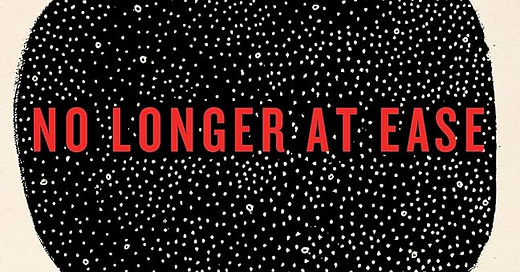In writing the book reviews of Afro-Reads, my goal is to honor the literary contributions of African and Black writers from the diaspora.
By exploring the classics, biographies, and modern fiction to showcase not only the celebrated works by lesser known authors but well known, like Chinua Achebe (1930-2013) and also his lesser-accredited novels that deserve equal recognition.
Mercedes Mackay of the Royal African Society noted that:
“This second novel of Chinua Achebe is better than his first, and puts this Nigerian at the forefront of West African writers." (1961)
The novel’s title was inspired by lines in T.S. Eliot’s poem: ‘Journey of the Magi’:
“We returned to our places, these Kingdoms,
But no longer at ease here, in the old dispensation,
With an alien people clutching their gods.
I should be glad of another death.”
In reading this 65 year old West African novel, I am now appalled that any English curriculum could teach ‘Things Fall Apart’, without following up with the sequel, ‘No Longer At Ease’. Furthermore, the relevance of colonialism still harbors over Nigerian government & society to date.
Had Achebe seen premonitions of the future?
I finished this book last fall and at first when reading, it took me awhile to adjust. I haven’t read a classic literature in a while and I had to refresh my memory.
The novel centers around, Okonkwo’s grandson, Obi Okonkwo. The prodigal son is celebrated amongst the elders of this village for having returned to Nigeria after studying abroad for university.
With his new acclaimed knowledge he has hopes and dreams of a ‘new Nigeria.’ A government not run by the elders that are full of corruption. He soon discovers that the youth has already been largely affected by the consequences of their elders actions.
Obi finds himself having to make up for lost time when learning the realities of living back home. The job he acquired isn’t what he hopes, temptation for bribery comes knocking, and his romantic life takes a detour when it becomes overtaken by the past: the Igbo caste system.
****
In present day, how would Achebe respond to the misfortune that is bestowed on his beloved country? Just as during Obi’s time, the question still remains: Who will save Nigeria?
Quotes:
Interviews:
About the Author:
Achebe was a novelist, poet, and critic. Born in Ogidi, British Nigeria, Achebe's childhood straddled the worlds of Igbo traditional culture and postcolonial Christianity. He went to the University of Ibadan, where he became critical of how European literature depicted Africa.1
Achebe's early accolades include the Margaret Wong Memorial Prize (1959) for Things Fall Apart, the New Statesman Jock Campbell Award (1964), and the Commonwealth Poetry Prize (1972). Saint Louis Literary Award (1999), the Peace Prize of the German Book Trade (2002), and the Man Booker International Prize (2007). He also won the Dorothy and Lillian Gish Prize (2010) and the Dayton Literary Peace Prize (2010).2
https://artsandculture.google.com/entity/chinua-achebe/m01mzkd?hl=en
https://www.enotes.com/topics/chinua-achebe/questions/what-literary-awards-has-chinua-achebe-received-1095343#:~:text=Chinua%20Achebe%20received%20numerous%20literary,Literary%20Peace%20Prize%20(2010).








This is an essential project. The deeper you delve into African culture the more you realise that writers/ artists/ musicians have been undervalued and under promoted in the West- particularly in universities and further and higher education. Anyone giving African culture a shout out is doing good work. PS Am trying to buy every book as you review it.
I read No Longer At Ease last year and enjoyed it. It gives the reader so much to think about and it’s amazing (and disheartening) how the Nigeria in Achebe’s works isn’t so different from the Nigeria today.